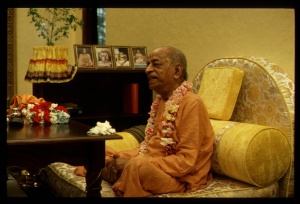SB 3.20.2: Difference between revisions
m (1 revision(s)) |
No edit summary |
||
| Line 1: | Line 1: | ||
{{info | {{info | ||
|speaker= | |speaker=Śaunaka Ṛṣi | ||
|listener= | |listener=Sūta Gosvāmī | ||
}} | }} | ||
[[Category:Srimad-Bhagavatam - Canto 03 Chapter 20|S02]] | |||
[[Category:Bhagavatam Verses Spoken by Saunaka Rsi - Vanisource|032002]] | |||
<div style="float:left">'''[[Srimad-Bhagavatam]] - [[SB 3|Third Canto]] - [[SB 3.20: Conversation Between Maitreya and Vidura|Chapter 20: Conversation Between Maitreya and Vidura]]'''</div> | |||
<div style="float:right">[[File:Go-previous.png|link=SB 3.20.1]] '''[[SB 3.20.1]] - [[SB 3.20.3]]''' [[File:Go-next.png|link=SB 3.20.3]]</div> | |||
{{RandomImage}} | |||
==== TEXT 2 ==== | ==== TEXT 2 ==== | ||
<div | <div class="verse"> | ||
kṣattā mahā-bhāgavataḥ | :kṣattā mahā-bhāgavataḥ | ||
kṛṣṇasyaikāntikaḥ suhṛt | :kṛṣṇasyaikāntikaḥ suhṛt | ||
yas tatyājāgrajaṁ kṛṣṇe | :yas tatyājāgrajaṁ kṛṣṇe | ||
sāpatyam aghavān iti | :sāpatyam aghavān iti | ||
</div> | </div> | ||
| Line 16: | Line 22: | ||
==== SYNONYMS ==== | ==== SYNONYMS ==== | ||
<div | <div class="synonyms"> | ||
''kṣattā''—Vidura; ''mahā-bhāgavataḥ''—a great devotee of the Lord; ''kṛṣṇasya''—of Lord Kṛṣṇa; ''ekāntikaḥ''—unalloyed devotee; ''suhṛt''—intimate friend; ''yaḥ''—he who; ''tatyāja''—abandoned; ''agra-jam''—his elder brother (King Dhṛtarāṣṭra); ''kṛṣṇe''—toward Kṛṣṇa; ''sa-apatyam''—along with his one hundred sons; ''agha-vān''—offender; ''iti''—thus. | |||
</div> | </div> | ||
| Line 23: | Line 29: | ||
==== TRANSLATION ==== | ==== TRANSLATION ==== | ||
<div | <div class="translation"> | ||
Śaunaka Ṛṣi inquired about Vidura, who was a great devotee and friend of Lord Kṛṣṇa and who gave up the company of his elder brother because the latter, along with his sons, played tricks against the desires of the Lord. | Śaunaka Ṛṣi inquired about Vidura, who was a great devotee and friend of Lord Kṛṣṇa and who gave up the company of his elder brother because the latter, along with his sons, played tricks against the desires of the Lord. | ||
</div> | </div> | ||
| Line 30: | Line 36: | ||
==== PURPORT ==== | ==== PURPORT ==== | ||
<div | <div class="purport"> | ||
The incident referred to here is that Vidura left the protection of his elder brother Dhṛtarāṣṭra, went traveling everywhere to sacred places and met Maitreya at Hardwar. Śaunaka Ṛṣi here inquires about the topics of the conversation between Maitreya Ṛṣi and Vidura. Vidura's qualification was that he was not only a friend of the Lord but also a great devotee. When Kṛṣṇa tried to stop the war and mitigate the misunderstanding between the cousin-brothers, they refused to accept His counsel; therefore Kṣattā, or Vidura, was unsatisfied with them, and he left the palace. As a devotee, Vidura showed by example that anywhere that Kṛṣṇa is not honored is a place unfit for human habitation. A devotee may be tolerant regarding his own interests, but he should not be tolerant when there is misbehavior toward the Lord or the Lord's devotee. Here the word aghavān is very significant, for it indicates that the Kauravas, Dhṛtarāṣṭra's sons, lost the war because of being sinful in disobeying the instructions of Kṛṣṇa. | The incident referred to here is that Vidura left the protection of his elder brother Dhṛtarāṣṭra, went traveling everywhere to sacred places and met Maitreya at Hardwar. Śaunaka Ṛṣi here inquires about the topics of the conversation between Maitreya Ṛṣi and Vidura. Vidura's qualification was that he was not only a friend of the Lord but also a great devotee. When Kṛṣṇa tried to stop the war and mitigate the misunderstanding between the cousin-brothers, they refused to accept His counsel; therefore Kṣattā, or Vidura, was unsatisfied with them, and he left the palace. As a devotee, Vidura showed by example that anywhere that Kṛṣṇa is not honored is a place unfit for human habitation. A devotee may be tolerant regarding his own interests, but he should not be tolerant when there is misbehavior toward the Lord or the Lord's devotee. Here the word ''aghavān'' is very significant, for it indicates that the Kauravas, Dhṛtarāṣṭra's sons, lost the war because of being sinful in disobeying the instructions of Kṛṣṇa. | ||
</div> | </div> | ||
__NOTOC__ | |||
<div style="float:right; clear:both;">[[File:Go-previous.png|link=SB 3.20.1]] '''[[SB 3.20.1]] - [[SB 3.20.3]]''' [[File:Go-next.png|link=SB 3.20.3]]</div> | |||
__NOTOC__ | |||
__NOEDITSECTION__ | |||
Revision as of 10:13, 6 May 2021

A.C. Bhaktivedanta Swami Prabhupada
TEXT 2
- kṣattā mahā-bhāgavataḥ
- kṛṣṇasyaikāntikaḥ suhṛt
- yas tatyājāgrajaṁ kṛṣṇe
- sāpatyam aghavān iti
SYNONYMS
kṣattā—Vidura; mahā-bhāgavataḥ—a great devotee of the Lord; kṛṣṇasya—of Lord Kṛṣṇa; ekāntikaḥ—unalloyed devotee; suhṛt—intimate friend; yaḥ—he who; tatyāja—abandoned; agra-jam—his elder brother (King Dhṛtarāṣṭra); kṛṣṇe—toward Kṛṣṇa; sa-apatyam—along with his one hundred sons; agha-vān—offender; iti—thus.
TRANSLATION
Śaunaka Ṛṣi inquired about Vidura, who was a great devotee and friend of Lord Kṛṣṇa and who gave up the company of his elder brother because the latter, along with his sons, played tricks against the desires of the Lord.
PURPORT
The incident referred to here is that Vidura left the protection of his elder brother Dhṛtarāṣṭra, went traveling everywhere to sacred places and met Maitreya at Hardwar. Śaunaka Ṛṣi here inquires about the topics of the conversation between Maitreya Ṛṣi and Vidura. Vidura's qualification was that he was not only a friend of the Lord but also a great devotee. When Kṛṣṇa tried to stop the war and mitigate the misunderstanding between the cousin-brothers, they refused to accept His counsel; therefore Kṣattā, or Vidura, was unsatisfied with them, and he left the palace. As a devotee, Vidura showed by example that anywhere that Kṛṣṇa is not honored is a place unfit for human habitation. A devotee may be tolerant regarding his own interests, but he should not be tolerant when there is misbehavior toward the Lord or the Lord's devotee. Here the word aghavān is very significant, for it indicates that the Kauravas, Dhṛtarāṣṭra's sons, lost the war because of being sinful in disobeying the instructions of Kṛṣṇa.